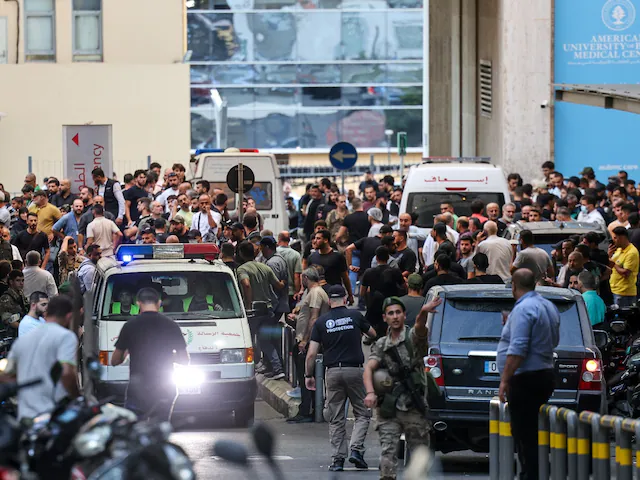A series of explosions across Lebanon on Tuesday killed at least nine people and injured nearly 3,000 others, according to Lebanese officials. The militant group Hezbollah has accused Israel of detonating pagers, handheld communication devices, and vowed retaliation.

Lebanese Information Minister Ziad Makary termed the incidents an “Israeli aggression.” The explosions occurred in areas known as Hezbollah strongholds, including southern Lebanon, Beirut’s southern suburbs, and the eastern Bekaa Valley.
Hezbollah, in a statement, confirmed that at least two of its fighters and a young girl were among the dead. The group described the incident as its “biggest security breach” in nearly a year of conflict with Israel.
The Israeli military, which has been engaged in cross-border exchanges with Hezbollah since the start of the Gaza war in October, declined to comment on the allegations.
United Nations Special Coordinator for Lebanon Jeanine Hennis-Plasschaert called the incident “an extremely concerning escalation” in the ongoing conflict.
The U.S. State Department said it was not involved in the explosions and did not know who was responsible. It renewed calls for a diplomatic solution to tensions between Israel and Lebanon.
Reports indicate that Iran’s ambassador to Lebanon, Mojtaba Amani, suffered a “superficial injury” in the blasts, according to Iran’s semi-official Fars news agency. This information could not be independently verified.

Hezbollah fighters have reportedly been using pagers as a low-tech means of communication to avoid location tracking. A pager is a wireless telecommunications device that receives and displays messages.
The incident has raised concerns about potential escalation in the region. However, experts remain skeptical about an imminent full-scale war between Israel and Hezbollah, which the United States has been working to prevent.
Matthew Levitt, former deputy director of the U.S. Treasury’s intelligence office, suggested the explosions could disrupt Hezbollah’s operations for some time.
The situation remains tense, with Hezbollah and Israel exchanging fire since October 7, when Hamas attacked Israel, triggering the Gaza war. Hezbollah has lost over 400 fighters in Israeli strikes over the past year.
As investigations continue, international observers are closely monitoring the situation for any signs of further escalation in the region.
The Lebanese health ministry urges calm and asks citizens to follow official channels for updates and emergency information.



